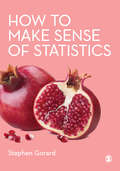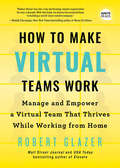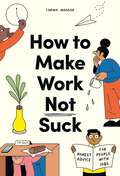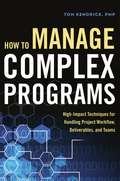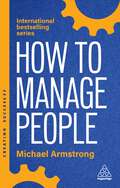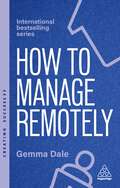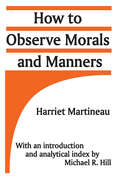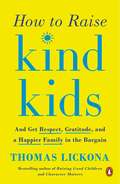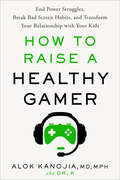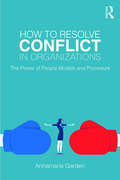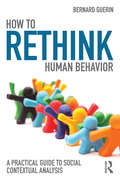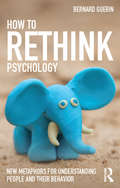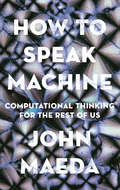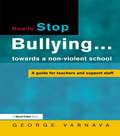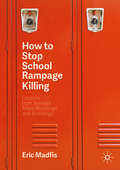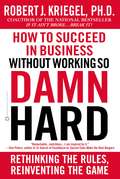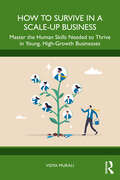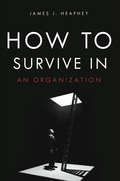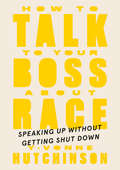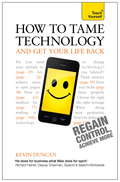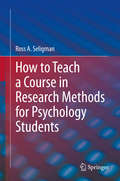- Table View
- List View
How to Make Sense of Statistics
by Stephen GorardIn a new textbook designed for students new to statistics and social data, Stephen Gorard focuses on non-inferential statistics as a basis to ensure students have basic statistical literacy. Understanding why we have to learn statistics and seeing the links between the numbers and real life is a crucial starting point. Using engaging, friendly, approachable language this book will demystify numbers from the outset, explaining exactly how they can be used as tools to understand the relationships between variables. This text assumes no previous mathematical or statistical knowledge, taking the reader through each basic technique with step-by-step advice, worked examples, and exercises. Using non-inferential techniques, students learn the foundations that underpin all statistical analysis and will learn from the ground up how to produce theoretically and empirically informed statistical results.
How to Make Virtual Teams Work: Manage and Empower a Virtual Team That Thrives While Working from Home (Ignite Reads)
by Robert GlazerA remote book on building a successful virtual culture from USA TODAY and WALL STREET JOURNAL bestselling author, Robert Glazer!Close to twenty-five percent of professionals today work remotely in some capacity (and even more since the start of the pandemic). There are a lot of benefits to companies who employ a virtual workforce: cost savings on office space and other overhead, improved job performance, better employee morale, and a broader pool of talent from which to recruit. However, there are also challenges: communication limitations, social isolation, and managing distractions, among others.In his book, How to Make Virtual Teams Work, Robert Glazer taps into his decade of experience managing a virtual office—and winning twenty "best places to work" awards—while providing leaders with a step-by-step playbook on how to intentionally build a remote workforce and culture by developing core values that provide guidance in hiring talent who works well remotely, creating comprehensive onboarding plans, using technology to communicate and connect with remote employees, and more. This goes way beyond a typical HR strategy book. By employing these specific strategies, leaders can build a remote environment that thrives and make it one of their key competitive advantages.
How to Make Work Not Suck: Honest Advice for People with Jobs
by Carina MaggarGoogle doesn't have the answer Dream big, plan smallWhen in doubt, HelveticaAssumption is the mother of all fuck upsStay curiousNo one knows what they're doing, neither should youIn this straight-talking guide to the real world of work, discover genuinely useful advice that will help you find the confidence to go for that promotion, quit your job, break into that industry, nail that pitch or climb over a creative brick wall. With 120 irreverent, unusual but always useful insights, this book will help you reach your career goals.
How to Make Work Not Suck: Honest Advice for People with Jobs
by Carina MaggarGoogle doesn't have the answer Dream big, plan smallWhen in doubt, HelveticaAssumption is the mother of all fuck upsStay curiousNo one knows what they're doing, neither should youIn this straight-talking guide to the real world of work, discover genuinely useful advice that will help you find the confidence to go for that promotion, quit your job, break into that industry, nail that pitch or climb over a creative brick wall. With 120 irreverent, unusual but always useful insights, this book will help you reach your career goals.
How to Make the Biggest Decision of Your Life
by George Blair-West Jiveny Blair-WestChoosing to marry and share your life with someone is one of the most important decisions you can make in life. But with divorce rates approaching 50 per cent in some parts of the world, it's clear many of us need some help picking a partner. In this easy-to-read guide, psychiatrist George Blair-West and relationship coach Jiveny Blair-West unlock the secrets to making the biggest decision of your life. Think about it. Why is it that we often put more conscious thought into choosing a car than choosing who will be our partner? This book will help you understand what drives your attraction and how to break bad habits by revealing: · How attraction works · How we can make sense of the unconscious and conscious forces that lead us into our relationships · How to avoid marrying people who are a poor match · How we can better choose the other parent of our childrenAll meaningful change in life begins with a deepening of understanding, a raising of self-awareness and consciousness. George and Jiveny provide the knowledge to make the unconscious conscious, and give you more power over your relationship destiny.
How to Manage Complex Programs: High-Impact Techniques for Handling Project Workflow, Deliverables, and Teams
by Tom KendrickTo see a program successfully through to completion, a program manager must break the work down into simpler, smaller pieces and organize it into interdependent tasks…and this book helps you do just that. Projects require managers, but programs warrant maestros. Tasked with overseeing multiple project teams and thousands of activities, program managers have one of the most challenging jobs in the market. Too many overburdened managers are leaving otherwise great jobs, even the field entirely, because they haven&’t equipped themselves with the right tools in hand to take on this complex but fulfilling job.Complete with diagrams, graphs, and real-life examples, How to Manage Complex Programs explains the ins and outs of program management and provides concrete and effective techniques for structuring deliverables, workflow, and staffing. You will learn to: Decompose complex deliverables into manageable chunksDevelop coherent plans for component projectsHandle cross-project dependenciesOrganize program staff and project leaders into a high-performing teamYes, program management is challenging but the most rewarding jobs always are. Don&’t let yourself become overburdened and tempted to leave a field in high demand of hard workers such as yourself. These proven strategies are the key to finding both relief and success!
How to Manage People: Fast, Effective Management Skills that Really Get Results (Creating Success)
by Michael ArmstrongBestselling author Michael Armstrong provides valuable insight into the skills required to be an effective manager, helping you get the best from your staff through motivation, reward and leadership.This fully updated 6th edition now features even more practical exercises, useful templates, and top tips, alongside advice on managing virtual teams, enhancing employee engagement and managing conflict. Essential reading for anyone who wants to get the best from their teams, How to Manage People distils the essence of good management into one handy, easy-to-use book.The Creating Success series of books...Unlock vital skills, power up your performance and get ahead with the bestselling Creating Success series. Written by experts for new and aspiring managers and leaders, this million-selling collection of accessible and empowering guides will get you up to speed in no time. Packed with clever thinking, smart advice and the kind of winning techniques that really get results, you'll make fast progress, quickly reach your goals and create lasting success in your career.
How to Manage Remotely: Work Effectively, No Matter Where You Are (Creating Success)
by Gemma DaleNon-office based work is here to stay, but everyone experiences it differently. Find out how to make working at home and remote work, work for you. How to Work Remotely will help anyone adapt to home, remote and hybrid working. Suitable for homeworkers, or the managers and leaders of homeworkers, this highly practical book will address how to be successful and build a career while working remotely, or away from the office. Packed with practical exercises and top tips, the book includes advice on wellbeing when working from home, how to get organized, how to start a new role when you're not in the office and suggestions on the best ways to be productive. HR specialist Gemma Dale also explains about managing the performance of remote and hybrid teams and effectively making home working accessible for all colleagues.The Creating Success series of books...Unlock vital skills, power up your performance and get ahead with the bestselling Creating Success series. Written by experts for new and aspiring managers and leaders, this million-selling collection of accessible and empowering guides will get you up to speed in no time. Packed with clever thinking, smart advice and the kind of winning techniques that really get results, you'll make fast progress, quickly reach your goals and create lasting success in your career.
How to Observe Morals and Manners
by Harriet MartineauHow to Observe Morals and Manners is the first systematic and substantive treatise on the methodology of sociological research. First published in 1838 and long out of print, this new edition presents for modern students research techniques used by those whose work has been the foundation for present-day social science. The book is based upon two years of intensive field research in the United States, and is a pioneering benchmark for all subsequent methodology texts in sociology. Martineau charts a comprehensive guide to sociological observation, exploring problems of bias, hasty generalization, samples, reactivity, interviews, participant observation, corroboration, and data recording techniques. Couching her observations as advice to travellers visiting foreign lands, she warns against preconceptions and urges strict reporting of observed patterns of cross-sections of social life. She also illustrates how to use interview data to corroborate observational data. Pragmatic tips and specific questions are suggested for exploring the major institutions of society, including religion, education, marriage, popular culture, markets, prisons, police, media, government, fine arts, and charities. Intended as a treatise on methodology, the book is also an insightful work of theory. Before Marx, and well before Durkheim and Weber, Martineau examined social class, forms of religion, types of suicide, national character, domestic relations and the status of women, delinquency and criminology, and the intricate interrelationships between social institutions and the individual. The book will be of interest to sociologists, geographers, anthropologists, historians, and researchers in women's studies. The introduction by Michael R. Hill locates the book within Martineau's overall epistemology of social analysis, revealing her to be a reflexive, critical, and scientific pioneer of sociological thought.
How to Raise Kind Kids: And Get Respect, Gratitude, and a Happier Family in the Bargain
by Thomas LickonaCan you teach a child to be kind? This vital question is taking on a new urgency as our culture grows ever more abrasive and divided. We all want our kids to be kind. But that is not the same as knowing what to do when you catch your son being unkind. A world-renowned developmental psychologist, Dr. Thomas Lickona has led the character education movement in schools for forty years. Now he shares with parents the vital tools they need to bring peace and foster cooperation at home. Kindness doesn’t stand on its own. It needs a supporting cast of other essential virtues—like courage, self-control, respect, and gratitude. With concrete examples drawn from the many families Dr. Lickona has worked with over the years and clear tips you can act on tonight, How to Raise Kind Kids will help you give and get respect, hold family meetings to tackle persistent problems, discipline in a way that builds character, and improve the dynamic of your relationship with your children while putting them on the path to a happier and more fulfilling life.
How to Raise a Healthy Gamer: End Power Struggles, Break Bad Screen Habits, and Transform Your Relationship with Your Kids
by Alok KanojiaA former gamer and Harvard-trained psychiatrist offers a proven, tested plan to help parents define, set, and reinforce healthy boundaries around video games and help kids who have developed an addiction to gaming.&“I highly recommend this calm, structured, and nurturing approach to better and less screen use.&”—Tina Payne Bryson, PhD, New York Times bestselling coauthor of The Whole-Brain Child and No-Drama DisciplineHow much should I let them play? How do I get them to be interested in anything else?! When it comes to family rules around video games, most parents are at a loss. After all, our technologically invasive world is something previous generations didn&’t have to wrestle with, so we have no model for how to guide our families through the rapidly changing landscape, no blueprint for setting healthy gaming boundaries and keeping them in place. A former Harvard Medical School instructor and one of the foremost experts on video game psychology, Dr. Alok Kanojia—known as &“Dr. K&” to his millions of followers—has firsthand knowledge of this modern issue: He needed professional help to break his own gaming habits in college, an experience that fueled his interest in learning how to help others. Drawing on Dr. K&’s professional specialization in working with people of all ages and varying degrees of addiction, and the most recent research from neuroscience and psychology, How to Raise a Healthy Gamer teaches parents a new skill set for negotiating gaming culture and offers solutions rooted in the science of treating addiction, including: • An eight-week, step-by-step road map for setting, enforcing, and troubleshooting healthy gaming boundaries.• Advice on how to react when your child becomes irritable, rude, or seemingly directionless.• Essential communication strategies for reaching kids who have developed a serious gaming problem.• The neuroscientific and psychological reasons that children gravitate to video games and how to help them meet these needs in real life.• Insights and advice on dealing with behavioral issues that often accompany game use: ADHD, spectrum disorders, and substance abuse. Whether your goal is to prepare your child for a healthy relationship to technology or to curb unhealthy amounts of time spent gaming, How to Raise a Healthy Gamer will help you better understand, communicate with, and—ultimately—empower your gaming enthusiast to live their best life.
How to Read Like You Mean It (Cultural Dialectics)
by Kyle ConwayIn this candid and concise volume, Kyle Conway, author of The Art of Communication in a Polarized World, considers how we can open ourselves to others and to ideas that scare us by reading difficult texts. Conway argues that because we resist ideas we don’t understand, we must embrace confusion as a constitutive part of understanding and meaningful exchange, whether between a reader and a text or between two people. Building on the work of hermeneutics scholar Paul Ricoeur, Conway evaluates the recurring paradox of miscommunication that results in deeper understanding and proposes strategies for reading that will allow individuals give up the illusion of certainty. In elegant and compelling prose, Conway introduces readers to the idea that it is through uncertainty that we can gain access to new and meaningful worlds—those of texts and other people.
How to Resolve Conflict in Organizations: The Power of People Models and Procedure
by Annamaria GardenThis is a comprehensive guide using People Models to understand and resolve conflict at different levels of the organization. It starts at the inter-organizational level explaining conflict between organizations that are involved in mergers and acquisitions. It looks at this kind of conflict not from the point of view of a business and economic rationale but from the point of view of there being a relationship between the two organizations. Here, this relationship is described by a People Model which outlines three different relationship types. In the subsequent chapters we look at the organizational level; first at structural conflict and then at team conflict. In each chapter there is a People Model to explain and resolve conflict. Structural conflict is explained by the Myers Briggs Type Indicator (MBTI) and team conflict is explained by the Schutz model of Inclusion, Control and Openness. In the next chapter the conflict is explained in terms of Gestalt psychology and looks at interpersonal conflict. Carl Jung is then used to explore inner conflict; followed by a chapter on life conflict exploring conflict in terms of how you live a life. The final chapter is focused on the applications of the People Models analysing Donald Trump and Tony Blair. Following through the entire book is a step-by-step procedure called a People Procedure, which is contrasted with a Business Procedure. The former guides you through a process to unravel and resolve conflict.
How to Rethink Human Behavior: A Practical Guide to Social Contextual Analysis (Exploring the Environmental and Social Foundations of Human Behaviour)
by Bernard GuerinDeveloped from the author’s long teaching career, How to Rethink Human Behavior aims to cultivate practical skills in human observation and analysis, rather than offer a catalogue of immutable ‘facts’. It synthesizes key psychological concepts with insights from other disciplines, including sociology, social anthropology, economics, and history. The skills detailed in the book will help readers to observe people in their contexts and to analyze what they observe, in order to make better sense of why people do what they do, say what they say, and think what they think. These methods can also be applied to our own thoughts, talk and actions - not as something we control from ‘within’ but as events constantly being shaped by the idiosyncratic social, cultural, economic and other contexts in which our lives are immersed. Whether teaching, studying, or reading for pleasure, this book will help readers learn: How to think about people with ecological or contextual thinking How your thinking is a conversation with other people How to analyze talk and conversations as social strategies How capitalist economies change how you act, talk and think in 25 ways How living in modern society can be linked to generalized anxiety and depression How to Rethink Human Behavior is important interdisciplinary reading for students and researchers in all fields of social science, and will especially appeal to those interested in mental health. It has also been written for the general reading public who enjoy exploring new ideas and skills in understanding themselves and other people.
How to Rethink Psychology: New metaphors for understanding people and their behavior (Exploring the Environmental and Social Foundations of Human Behaviour)
by Bernard GuerinBased on the author’s forty years of experience in psychology, philosophy, and the social sciences, How to Rethink Psychology argues that to understand people we need to know more about their contexts than the dominant modes of thinking and research presently allow. Drawing upon insights from sources as diverse as Freud, CBT, quantum physics, and Zen philosophy, the book offers several fascinating new metaphors for thinking about people and, in doing so, endeavors to create a psychology for the future. The book begins by discussing the significance of the key metaphor underlying mainstream psychology today – the ‘particle’ or ‘causal’ metaphor – and explains the need for a shift towards new ‘wave’ or ‘contextual’ metaphors in order to appreciate how individual and social actions truly function. It explores new metaphors for thinking about the relationship between language and reality, and teaches the reader how they might reimagine the processes involved in the act of thinking itself. The book concludes with a consideration of how these new metaphors might be applied to practical methods of research and understanding change today. How to Rethink Psychology is important reading for upper-level and postgraduate students and researchers in the fields of social psychology, critical psychology, and the philosophy of psychology, and will especially appeal to those studying behavior analysis and radical behaviorism. It has also been written for the general reading public who enjoy exploring new ideas in science and thinking.
How to Shop for Free: Shopping Secrets for Smart Women Who Love to Get Something for Nothing
by Kathy SpencerFor fashionistas and carpool moms alike: a veteran super-shopperOCOs secrets for finding insider deals and working the coupons and promotions to get much of their shopping lists for free
How to Speak Machine: Computational Thinking for the Rest of Us
by John MaedaVisionary designer and technologist John Maeda defines the fundamental laws of how computers think, and why you should care even if you aren't a programmer."Maeda is to design what Warren Buffett is to finance." --WiredJohn Maeda is one of the world's preeminent interdisciplinary thinkers on technology and design. In How to Speak Machine, he offers a set of simple laws that govern not only the computers of today, but the unimaginable machines of the future. Technology is already more powerful than we can comprehend, and getting more powerful at an exponential pace. Once set in motion, algorithms never tire. And when a program's size, speed, and tirelessness combine with its ability to learn and transform itself, the outcome can be unpredictable and dangerous. Take the seemingly instant transformation of Microsoft's chatbot Tay into a hate-spewing racist, or how crime-predicting algorithms reinforce racial bias.How to Speak Machine provides a coherent framework for today's product designers, business leaders, and policymakers to grasp this brave new world. Drawing on his wide-ranging experience from engineering to computer science to design, Maeda shows how businesses and individuals can identify opportunities afforded by technology to make world-changing and inclusive products--while avoiding the pitfalls inherent to the medium.
How to Stop Bullying towards a non-violent school: A guide for teachers and support staff
by George VarnavaBy providing teachers with a practical intervention program to prevent bullying in their schools, this book gives the reader tried and tested strategies to tackle a very challenging problem. Creating a safe school environment where pupils feel secure is increasingly difficult, but this book shows how to devise a strategy, put it into practice, measure its effectiveness and extend the good practice into the wider community. The involvement of young people is a key element of this process. With its roots firmly in practice, the book is based on a study of' common characteristics of schools that have successfully reduced bullying; case studies that show how change can be achieved; raising whole-school awareness of the problem; how to tackle bullying as a whole-school issue; involving the students and the student council; delivering in-service training to colleagues. Primary and secondary school teachers, the school management team, learning mentors, teaching assistants and governors will find the guidance clear and suggested approaches helpful.
How to Stop School Rampage Killing: Lessons from Averted Mass Shootings and Bombings
by Eric MadfisThis book tackles the important question of how we can understand and learn from the school rampage killings that have been prevented. In the flood of recent accounts and analyses of deadly school rampage killings that plague society and inspire widespread public fear, very little attention has been given to the incidents that almost were. Building on Madfis’ previous book, The Risk of School Rampage: Assessing and Preventing Threats of School Violence (2014), this vital work addresses key gaps in school violence scholarship through the examination of averted school rampage incidents in the United States and advances existing knowledge through ground-breaking insights from the latest research on mass murder, violence prevention, bystander intervention, disciplinary policy, and threat assessment in school contexts. This empirical study utilizes in-depth interviews conducted with school and police officials (administrators, counselors, security guards, police officers, and teachers) directly involved in averting potential school rampages to explore the processes by which threats are assessed and school rampage plots are thwarted. Madfis finds that many common contemporary school violence prevention policies and practices are ineffective at preventing rampage attacks and may actually increase the likelihood of their occurrence. Rather than uncritically adopting such problematic approaches, Madfis argues that schools must model prevention practices upon what has proven successful in averting potentially deadly incidents.
How to Succeed in Business Without Working So Damn Hard: Rethinking the Rules, Reinventing the Game
by Robert J. KriegelMore breathing space, more time to think, and more of the joy that comes with great work and great ideas...this can be your work life! Bestselling author Robert J. Kriegel has been acclaimed as a truly innovative voice on the American business scene. Now the man who the New York Times said has "spurred a revolution in performance practices" challenges you to break out of old modes and mind-sets. The bold, innovative strategies discussed by Dr. Kriegel help you develop dramatic new solutions to old problems, create exciting new possibilities, and succeed beyond what you ever thought possible, without having to work so damn hard! Book jacket.
How to Survive in a Scale-Up Business: Master the Human Skills Needed to Thrive in Young, High-Growth Businesses
by Vidya MuraliWorking in a scale-up is exciting, but it can also be exhausting. This book is your emotional survival kit for succeeding in a fast-paced and unpredictable environment.Scale-ups attract ambitious, driven and hardworking individuals seeking excitement, ownership, freedom and greater rewards. However, these opportunities often come with challenges. Understanding the emotional and behavioural patterns commonly seen in scale-ups – and learning from others’ experiences – can help you move from struggling to thriving.In this book, author Vidya Murali brings together: A personal scale-up suitability checklist to help assess and understand whether scale-ups are the right environment for you based on your skills and preferences Guidance on what to look for when interviewing, and how to set yourself up for success in the first 90 days Insights, frameworks and coaching questions to tackle toxic patterns commonly seen in scale-ups Real-life case studies from scale-up leaders with lessons and strategies Practical strategies for introverts, highly sensitive people, ethnic minorities and people with ADHD and/or dyslexia to thrive in scale-ups Tools for building your emotional skills to progress and thrive in scale-ups – including if you lose your job or face a mental health breakdown A must-read for anyone transitioning into scale-ups or already working in one, this book will be of immense interest to graduates seeking their first full-time role, professionals transitioning from corporate environment, leaders – including founders – as well as HR professionals and coaches.
How to Survive in an Organization
by James HeapheyJim Heaphey unravels the layers of organizational life exposing the myths upon which corporations and organizations rely for their very existence. Examined are the dual myths of management wisdom and performance evaluation. Examined also is the makeup of people in groups and the human condition; the nature of power; and the managerial tactics of manipulation used to control people singularly or in the group. The author presents tactics and strategies for dealing with all of these aspects and more. How To Survive In An Organization is for the realist who is willing to look at organizational life as it really is and is anxious to find a way to survive and succeed.
How to Talk to Your Boss About Race: Speaking Up Without Getting Shut Down
by Y-Vonne HutchinsonAn indispensable practical toolkit for dismantling racism in the workplace without fearReporting and personal testimonials have exposed racism in every institution in this country. But knowing that racism exists isn&’t nearly enough. Social media posts about #BlackLivesMatter are nice, but how do you push leadership towards real anti-racist action?Diversity and inclusion strategist Y-Vonne Hutchinson helps tech giants, political leaders, and Fortune 500 companies speak more productively about racism and bias and turn talk into action. In this clear and accessible guide, Hutchinson equips employees with a framework to think about race at work, prepares them to have frank and effective conversations with more powerful leaders, helps them center marginalized perspectives, and explains how to leverage power dynamics to get results while navigating backlash and gaslighting. How to Talk To Your Boss About Race is a crucial handbook to moving beyond fear to push for change. No matter how much formal power you have, you can create antiracist change at work.
How to Tame Technology and Get Your Life Back: Teach Yourself
by Kevin DuncanTechnology can be a wonderful thing. It can also be a curse when it overwhelms us. If your phone, computer or other devices are beginning to rule your life, then you need help. We don't have to be ruled by our machines. It's time for us humans to fight back. 'How to Tame Technology' tells you exactly what to do, practical tips and simple things that you can do to regain control. Take the test and find out just how addicted you are - then learn how to cure yourself. 'I can't talk now, I'm on the phone' For those of us suffering from technological overload, it's time to pause and think. Author and Plain English commentator Kevin Duncan has trained and advised some of the UK's top companies, including Saatchi & Saatchi and Shell, in how to cope with all this. This thought-provoking book grapples with just how addicted we have become to technology and offers a set of ideas to help wean us off our technological drugs and lead a more fulfilling life. It looks briefly at how we got here, tests you on how serious your condition is and then offers real solutions, including rapid sequential tasking (v multitasking), communicating concisely, using the best method of communication for the job, all while retaining your sense of humour and enthusiasm. 'Every page is a prompt to imagine things differently. A handbook for these challenging times ahead.' Mark Earls, author of Herd  'He does for business what Nike does for sport.' Richard Hytner, Deputy Chairman, Saatchi & Saatchi Worldwide  'Anyone who owns a mobile should have this on their shelf.' Robert Ashton, author The Life Plan
How to Teach a Course in Research Methods for Psychology Students
by Ross A. SeligmanThis book is a step-by-step guide for instructors on how to teach a psychology research methods course at the undergraduate or graduate level. It provides various approaches for teaching the course including lecture topics, difficult concepts for students, sample labs, test questions, syllabus guides and policies, as well as a detailed description of the requirements for the final experimental paper. This book is also supplemented with anecdotes from the author’s years of experience teaching research methods classes. Chapters in this book include information on how to deliver more effective lectures, issues you may encounter with students, examples of weekly labs, tips for teaching research methods online, and much more. This book is targeted towards the undergraduate or graduate professor who has either not yet taught research methods or who wants to improve his or her course. Using step by step directions, any teacher will be able to follow the guidelines found in this book that will help them succeed.How to Teach a Course in Research Methods for Psychology Students is a valuable resource for anyone teaching a quantitative research methods course at the college or university level.
